- Home Page
- Paper Kites
- ... Delta Kite
How to Make a Paper Delta Kite
Step by Step—Page 2 of 3
The MBK Paper Delta
The Leading Edges
Measure Rectangles
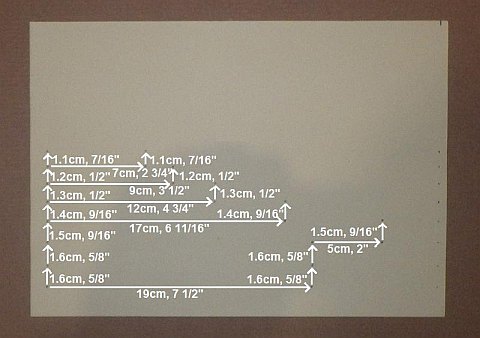 Measured and dots marked
Measured and dots marked- Measure and mark dots where indicated in the photo. It will be helpful to lightly rule some long horizontal lines first, at the indicated intervals.
Draw Lines
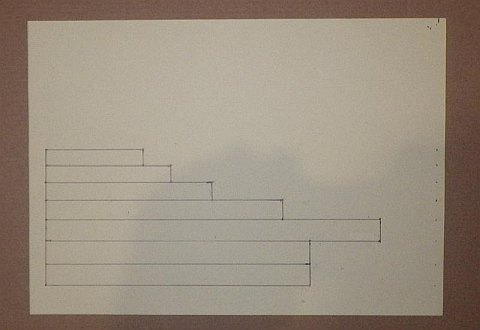 Lines drawn between dots
Lines drawn between dots- Using your pencil and ruler, connect the dots as shown.
Duplicate Rectangles
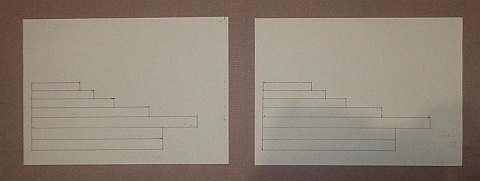 The rectangles duplicated
The rectangles duplicated- Place another sheet of paper over the one with rectangles drawn.
- Trace dots at the positions of the rectangle corners. Up against a window works well, with sunshine lighting up both thicknesses of paper from behind.
- Rule lines between the corner dots. There's the original and the copy in the photo.
Note: If you have trouble tracing due to dark paper or insufficient light: With a needle, poke holes through the two sheets of paper at the corners of the shapes. Be careful not to let them shift! Then rule lines between the pinholes on the blank sheet.
Tape Over
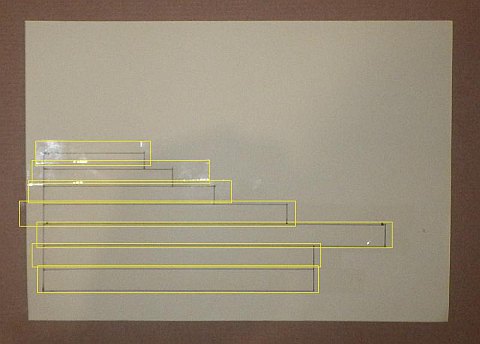 Rectangles taped
Rectangles taped- Lay strips of sticking tape over the rectangles as illustrated in the photo.
- The strips of tape can overlap slightly and should cover the rectangles completely.
- Make sure both sheets of paper are done before continuing.
Cut Out
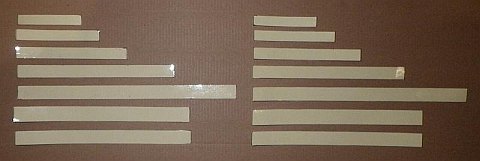 Rectangles cut out
Rectangles cut out- Cut out the rectangles, which will be totally covered in tape on one side. Some curl is OK as you can see in the photo above.
Stick Together
The following instructions relate to
one group of rectangles:
 Two widest rectangles butt joined
Two widest rectangles butt joined- Lay down the two widest rectangles with taped sides facing the floor, butted together as shown. Both rectangles are 19 cm (7 1/2 in.) long.
- Lay tape across the join, as shown, before wrapping the overhanging tape around to the other side.
Note: Use a ruler or other long straight edge to verify the rectangles are perfectly lined up before applying the tape!
 24 cm (9 1/2 in.) piece on top, taped at each end
24 cm (9 1/2 in.) piece on top, taped at each end- Keeping the taped side facing down, place the longest piece on top of the joined ones. It's slightly narrower, so try to center it over the wider piece.
- Position the piece as shown in the photo and secure with a short strip of tape at each end, wrapping the overhangs around.
Note: The procedure from here is just like doing the vertical spar. In each case, take the next longest piece, position it taped-side-down on top, then secure with tape at both ends. Just follow the photos and captions below:
 17 cm (6 11/16 in.) piece goes on
17 cm (6 11/16 in.) piece goes on 12 cm (4 3/4 in.) piece goes on
12 cm (4 3/4 in.) piece goes on 9 cm (3 1/2 in.) piece goes on
9 cm (3 1/2 in.) piece goes on 7 cm (2 3/4 in.) piece goes on
7 cm (2 3/4 in.) piece goes on
Encase in Tape
All done? Now:
 Taped all along both long edges and folded around
Taped all along both long edges and folded around- Just like you did for the vertical spar, run tape all along both long edges of the layered piece and fold around to the other side as indicated in the photo.
- Snip any excess tape off the short ends. That's one leading edge done.
 The two leading edges completed
The two leading edges completed- Now tape together and encase the remaining seven rectangles in exactly the same way.
The Spreader
Measure Shapes
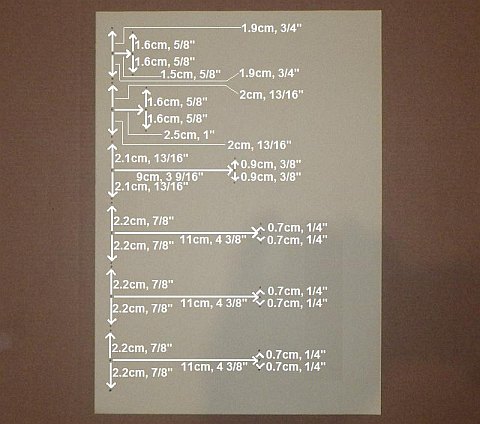 Measured and dots marked
Measured and dots marked- Measure and mark dots where indicated by following the arrows.
Draw Lines
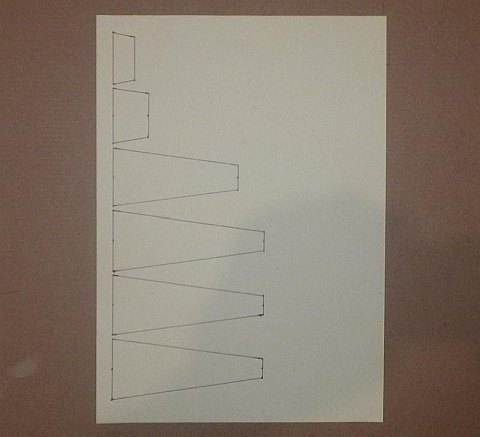 Lines drawn between dots
Lines drawn between dots- Using your ruler, connect the dots as shown. As you can see in the photo, you don't need a line drawn across the middle of each shape.
Duplicate Shapes
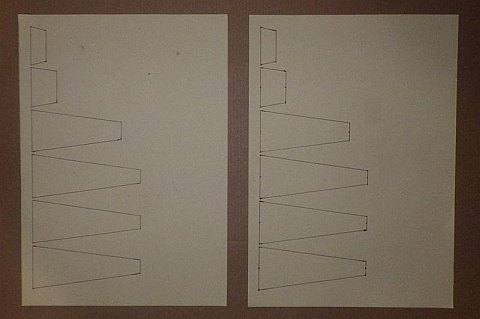 The six shapes duplicated
The six shapes duplicated- Place a blank sheet of paper over the one with shapes drawn.
- Trace dots at the positions of the shape corners. Up against a window works well, with sunshine lighting up both thicknesses of paper from behind.
- Rule lines between the corner dots. There's the original and the copy in the photo.
Note: If you have trouble tracing due to dark paper or insufficient light: With a needle, poke holes through the two sheets of paper at the corners of the shapes. Be careful not to let them shift! Then rule lines between the pinholes on the blank sheet.
Tape Over
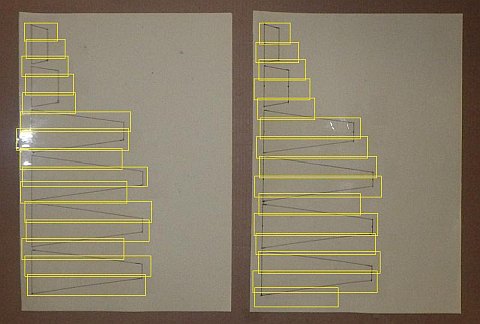 Shapes taped
Shapes taped- Lay strips of sticking tape over the spar shapes as illustrated in the photo.
- The strips of tape can overlap slightly and should cover the shapes completely. That's the only requirement!
Cut Out
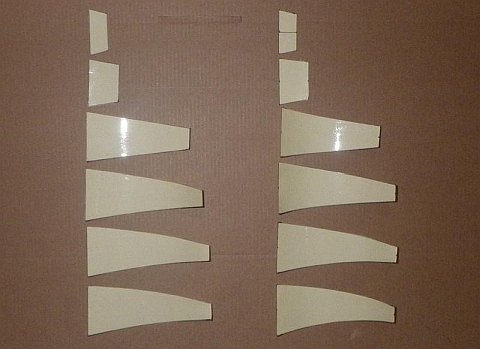 Shapes cut out
Shapes cut out- Cut out the shapes, which will be totally covered in tape on one side. A little bit of curl is OK.
Stick Together
 Longest shapes stacked and taped together
Longest shapes stacked and taped together- Lay down the six longest shapes in two stacks of three. All the shapes should have the taped side facing down.
- Make sure the shapes are aligned, then wrap a short strip of tape around both ends of each stack as indicated in the photo.
 Next-shortest shapes added
Next-shortest shapes added- Now place the two next-shortest shapes over the stack, also with the taped sides facing down.
- Align the left edges with the left side of the stack, and center the shapes inside the long edges of the stack.
- Wrap a short strip of tape around each left edge, and stick down each right edge to the top of the stack. See the photo.
Note: This step is repeated for the remaining shapes, getting shorter each time. Just follow the photos and captions:
 Next-shortest shapes added
Next-shortest shapes added Next-shortest shapes added
Next-shortest shapes added
Encase in Tape
 Tape laid along and folded around long edges
Tape laid along and folded around long edges- As already done for the vertical spar and leading edges, lay tape all along the long edges and fold around to the other side.
- Trim off any overhanging tape using scissors.
- These spreader pieces are now ready for the next step.
Dihedral Cutouts
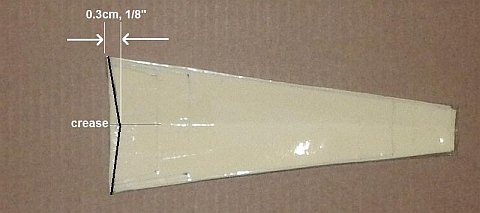 Measured and lines drawn on one spreader piece
Measured and lines drawn on one spreader piece- Take a spreader piece and fold in half near the wide end. Create a crease line near the edge.
- Carefully measure 0.3 cm (1/8 in.) along the crease from the edge, and make a small dot.
- Draw lines from the corners to the dot as shown in the photo.
- Measure and draw lines on the other spreader piece in the same way.
Note: A thin gray line has been added to show where the crease is.
 Cutouts done on both spreader pieces
Cutouts done on both spreader pieces- Using scissors, cut along the two ruled lines on both pieces to remove the wedges of paper layers. See the photo, which has the pieces flipped shiny-side-up.
Attaching Vertical Spar to Sail
Tape One Edge
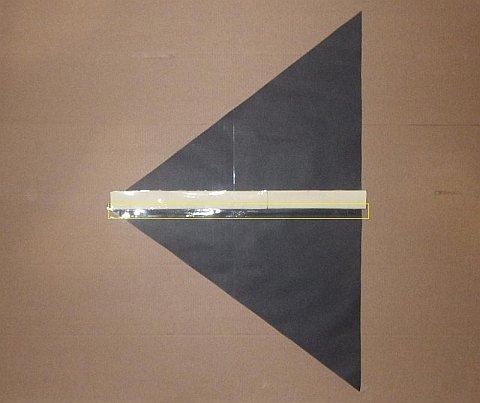 One edge taped, before trimming ends
One edge taped, before trimming ends- Take the vertical spar piece and lay it down, aligned with one of the guide lines and overhanging the other guide line as shown. The single-thickness end should be at the nose end of the sail. It's at the left in the photo. The shorter layers of paper should be underneath, out of sight.
- Tack in place with squares of sticking tape—at least one in the middle and one near each end.
- All good? If not, pull off and try again. Now lay a strip of tape down the whole length as indicated by the yellow rectangle in the photo.
- Trim off any overhanging tape and paper at the ends using scissors.
Tape Other Edge
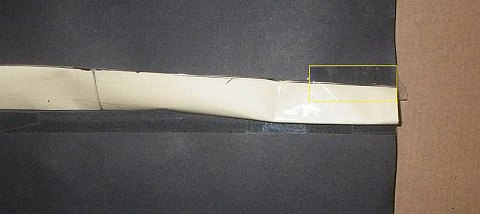 Edge tacked at one end
Edge tacked at one end- Flip the paper spar across, and flatten it down so the second guide line becomes visible.
- Go to the tail end, and pull the free edge of the rectangle across so it lines up with the second guide line. Tack it down with a short strip of tape as indicated in the photo.
Note: Don't worry if you get an off-center fold in the spar piece at this stage. It will come good in later steps.
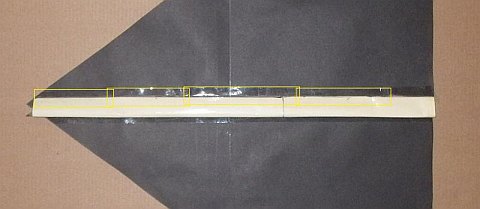 Edge taped the rest of the way
Edge taped the rest of the way- Using somewhat longer lengths of tape, tack down more and more of the spar, making sure the edge lines up with the second guide line.
- Go all the way across to the nose end of the sail as shown in the photo. The tape strips can overlap a little, but don't leave any gaps.
Note: It's just too tricky to
tape it all down in one go!
Shape the Spar
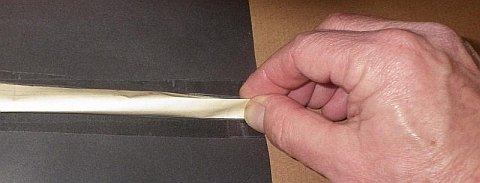 Pinching started at one end
Pinching started at one end- Go to one end of the spar, and carefully pinch it between finger and thumb as in the photo. The aim is to get a crease right in the middle.
Note: The spar won't crease sharp because of all the sticky tape, but pinch firmly anyway.
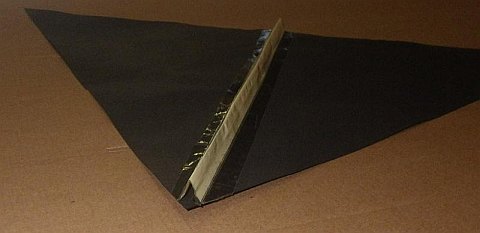 V shape formed all the way along
V shape formed all the way along- Work your way along the spar piece, pinching tightly all the way. I like to use both hands at once, close together.
- Go all the way along and then back again so nothing is missed. You have created a spar that is stiff enough to do the job required of it! See the photo.
As mentioned earlier, there's more kite making on this site than you can poke a stick at. :-)
Want to know the most convenient way of using it all?
The Big MBK E-book Bundle is a collection of downloads—printable PDF files which provide step-by-step instructions for many kites large and small.
That's every kite in every MBK series.
